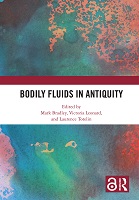Bodily Fluids in Antiquity
Proposal review

Contributor(s)
Bradley, Mark (editor)
Leonard, Victoria (editor)
Totelin, Laurence (editor)
Language
EnglishAbstract
Medical and philosophical theories of generation from the classical world are often classified according to whether the female as well as the male produces ‘seed’, the fluid substance which does the most important work in procreation. Aristotle is usually identified as the most influential proponent of the ‘one-seed model’, while Galen champions the ‘two-seed’ cause, and the debate between them continues to matter for centuries. At stake here is not just theoretical efficiency – how well the full complexities of parental resemblance are accounted for by the contending notions, for example — but also, it has been suggested, politics and patriarchy. Two seeds are better, more egalitarian, than one: the female role in generation is more positively valued in this model. This chapter will argue that, not only this characterisation, but the division itself, is misleading: particularly if viewed from a fluid perspective. Another way must be found to understand the key concepts involved in these foundational ancient debates about human procreation.
